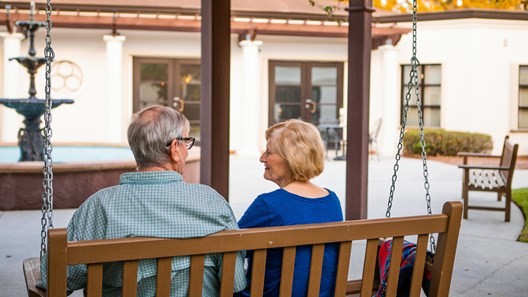How to Help an Elderly Parent with Depression

Many of us can feel a bit depressed from time to time. But that can take on a different connotation for our elderly parents.
It can be difficult to see the person who raised you suffering from depression, especially if you feel responsible for keeping them in a good mood.
You may try incredible hard to care for your elderly parent, and to attempt to “cheer them up.” This shows you are loving and kind, and they raised you well. But dealing with depression of any kind is often out of our capabilities. Thankfully, you can learn some tips on how to help an elderly parent with depression.
Here’s what you should know about this process and what your role can be within it.
First Things First: None of This is Your Fault
Knowing someone you love is suffering from depression can make you feel like you might be to blame. It’s common to feel that if you were only there for them more, they might not be feeling the way they do. This can hit even harder when it’s an older parent dealing with being depressed, as you might not be able to be there for them as much as you’d like to because of distance or simply because you’ve got plenty of other adult responsibilities, such as work or raising your own family.
However, feeling like it’s your fault that your elderly parent is depressed, or that it’s your sole responsibility to “cure” or “fix” their depression, is not only untrue, it’s unfair to you. Depression is a complex, multifaceted mental disorder that has many different components, ranging from brain chemistry, environmental factors, and situational conditions, to name but a few. Becoming personally wracked by guilt because an older parent is dealing with being depressed doesn’t help you or your parent, so try your best to nix those feelings right now. It is not your fault — your focus should instead be simply how to help.
Next: Understand that Depression is Treatable, but Not Necessarily Curable

There is absolutely nothing wrong with coming to realize that you can’t help your depressed elderly parent alone. There are countless resources on how to help your elderly parent with depression, ranging from talk therapy to psychiatric medication and beyond.
However, it’s crucial to understand that as depression is a complex mental disorder, the focus isn’t necessarily on “curing” someone who’s suffering from depression, but instead on managing their symptoms so they can live fuller and more fulfilling lives.
Understanding which types of treatments are better for caring for depression in your elderly parent can be a long and often exhausting process. Some types of therapy might work better than others, and the same goes for some prescription medications. Other things, such as working to address the situational conditions in your parent’s life that might be contributing to their depression, are also often long-term endeavors. The key here is that you cannot accomplish this by yourself. You should consider seeking professional help, perhaps in the form of a mental health professional.
Another concern may be that it is no longer safe for your depressed parent to live alone. In such a situation, the safest option may be a form of retirement community called a continuing care retirement community.
Continuing Care Retirement Communities: Caring for Elderly Parents with Depression

You may not have much familiarity with retirement communities outside the outdated notion of an “old folks’ home.”
That is not what we’re talking about here. We’re talking about modern, comfortable, attractive campuses known as continuing care retirement communities, built specifically to support aging adults who can no longer live alone.
A common cause of depression in older adults is loneliness. Continuing care retirement campuses protect against isolation with activities and events geared for socializing. Your parent can make new friends, engage in new hobbies, and find other ways to improve their mental outlook.
Because depression manifests in so many ways, it’s crucial to ensure there are systems in place to treat the whole patient, not just one or two of their symptoms. Retirement campuses are ideal for older residents suffering from depression because of the wide variety of services they offer to those residents, as they can often cover all the bases of what someone living with depression needs. These services can range from help taking medications to seeing healthcare professionals on a regular basis and much, much more.
Why Acts Retirement-Life Communities are a Great Choice for Helping Depressed Elderly Parents

As one of the largest retirement community networks in the United States, Acts is an excellent option for anyone who has concerns about how to deal with their elderly parent being depressed. With continuing care retirement campuses spread across nine states, we may have one close to you and ready to start helping now.
Plus, residents get access to incredible amenities and actives in a resort-style environment, and live entirely independently in an apartment, cottage home, or village. If their health situation changes and they require assisted living or skilled nursing care, that can occur right on the same campus.
It can be concerning if your older parent is exhibiting symptoms of depression. It can often feel even worse if you can’t be there for them in the capacity you want to be. But know that you can still help them. You can make sure your elderly parent gets the support they need by contacting a mental health professional, and/or by considering a beautiful Acts campus.
Explore more from Acts now:
27 independent living campuses in nine states, with health services like assisted living, skilled care and rehabilitation provided whenever needed.
25 campuses in eight states with direct entry into assisted living and/or skilled care.





